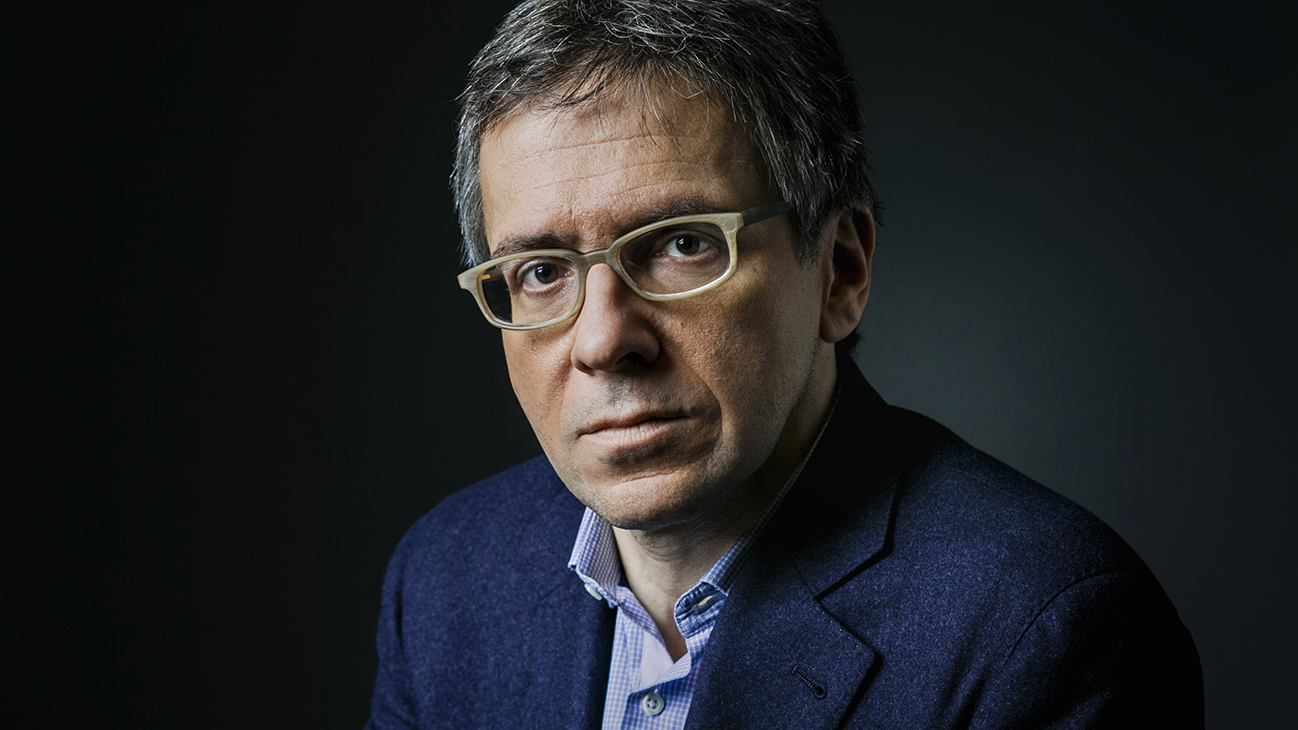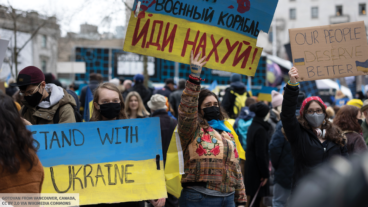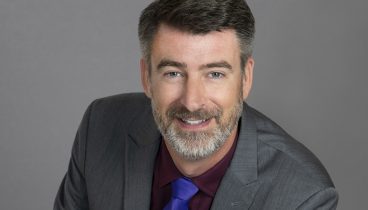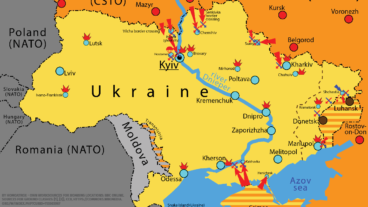As the president and founder of the Eurasia Group, the world’s leading political risk research and consulting firm, Ian Bremmer recently joined TED to discuss the global implications of the war in Ukraine and the permanent geopolitical shifts in the world order that we’ve already seen.
“In my lifetime, the most important geopolitical artifact is the fall of the Berlin Wall…,” Ian said to start off the event. “I think that in 30 years’ time, and I fear that in 30 years’ time… the second most important geopolitical artifact will be a piece of the rubble of the Maidan in Kyiv.”
Below is a summary of some of the key geopolitical shifts Ian explored during his TED event.
Key Geopolitical Shifts in the World Order
1. The End of the Worldwide “Peace Dividend”
Ian is a self-proclaimed “existential optimist”, but he admits it’s hard to be anything but negative about this conflict.
The war in Ukraine, Ian said, is “the end of the peace dividend.” Gone are the days of globalization as we know it, where we saw an increase in the ease of movement cross-border of goods, people, and ideas, he said, which led to unprecedented growth in human development and of a global middle class.
While the war won’t end globalization, Ian continued, it is ending the peace dividend in that overnight Europeans had to change their priorities and increase defense spending, enact policy on national security, and see coordination on NATO. This ramp up of national security within Europe will be permanent, Ian said, along with permanent deployments of military forces in the Baltic states, and an unwind of Europe’s energy dependency on Russian coal, oil, and gas.
2. Permanent Decoupling Between the West and Russia
The decoupling of Europe and US with Russia is permanent, Ian said. Even if this conflict ended in the best of terms, with Russia pulling out and essentially having peace again, Ian doesn’t think companies will choose to come back to Russia while Putin is still in power.
Russia will not be a global pariah, Ian continued, this isn’t possible when Russia’s “bestie” on the global stage is China — the soon to be most important economy in the world. Their relationship is still going strong, despite China’s declarations of being neutral when it comes to the war in Ukraine.
A silver lining in this, Ian said, is that China, while aligned with Putin, does not want a second cold war. They would rather have a settlement. While they won’t push hard for one, Ian continued, they don’t see a radical decoupling of the Russian and Chinese economies from Europe and the rest of the world in their best interest. This creates a bit of a buffer in how much this conflict may escalate, Ian said.
3. Renewed purpose and mission to NATO
A couple years ago, Ian said, NATO was waning in its importance. Today though, we are seeing a renewed sense of purpose, alignment, and consolidation between NATO members. Same with the European Union, Ian said. We’re seeing far more countries aligned with the common values of this Union throughout Europe. We’re also seeing the UK-EU relationship much smoother and functional since Brexit.
What Happens Next?
In the Q&A portion, Ian forecasted what could happen next in Russia’s war on Ukraine, including the potential for conflict to escalate or cease-fire negotiations.
Q: Is there space for negotiation?
Foreign ministers from both Ukraine and Russia recently met in Turkey and this meeting was as much of a non-event as the past three meetings in Belarus, Ian said. What we did see is an increase in humanitarian corridors to allow Ukrainians to leave the country. This is because Ukraine is interested in protecting as many civilians as possible, while Russia is interested in taking as much territory as possible while killing as few Ukrainians as possible. The rising death toll will have a negative impact on them internationally and domestically.
This is not close to a negotiated settlement, Ian added. Everyone close to the situation says the same thing, he added, Putin wants to take Kyiv and remove Zelensky from power. This will likely happen in the next couple of weeks one way or another.
Q: What level of support can the West give Ukraine before Putin considers it an act of war by NATO?
Putin has already been attacking NATO countries, Ian said, through relentless cyber-attacks with reckless abandon over the last several years. President Joe Biden met with Putin back in June, he continued, to discuss Russia’s cyber-attacks on critical infrastructure, and they did pull back on supporting these attacks. But Ian suspects those attacks will start up again as NATO continues to support Ukraine.
That fact that the west is sending weapons and providing real-time intelligence reports to help Ukraine defend themselves, Ian said, would be considered an act of war by Russia and we can expect them to retaliate. It’s a question of how they retaliate.
Q: Will Putin face enough pressure from inside Russia to be removed from power?
That’s unlikely until it happens, Ian said. If there are rumours, he continued, then that’s an obvious sign that nothing is happening because if these rumours were true, there would have already been action against those people.
It’s clear there is domestic pressure, Ian said, with 10,000 Russians having been detained and released for non-violent, anti-war protests. And certainly, he added, once the economy is imploding and goods aren’t on shelves in major Russian cities — which could happen in a couple of weeks — those demonstrations will only escalate and increase pressure.
What’s important to remember though, Ian said, is that Russian citizens are getting a completely pro-Putin view through the media. Putin has shut down all Western and independent media sites within Russia and completely controls the media. This is why Putin will not be out anytime soon.
Q: Is there an off ramp for Putin
The most likely off ramp, Ian said, is after Kyiv is taken and Zelensky is removed one way or another. At that point, the odds for a frozen conflict or cease-fire are a lot more plausible. Putin can sell that as a win back home, Ian said. That is the near-term potential break from conflict we’ll see. Russians have been happy with frozen conflict on their borders for years, Ian added.
An important point Ian added is that he doesn’t feel nuclear warfare is imminent. There is active de-confliction going on today between the US and Russia, and Russia and the UN, to prevent nuclear attacks. What’s unfortunate, he continued, is that nuclear will remain on the table now and forever as we move forward, which is quite debilitating from a human standpoint.
Watch more from Ian in the video below as he dives deep into the global fallout of the Russia-Ukraine war on energy, food security, and more.
Specializing in US foreign policy, states in transition, and global political risk, Ian Bremmer is one of the world’s leading global political risk researchers and consultants. He helps audiences make sense of the world around them by providing clear-headed insights on critical global issues.




